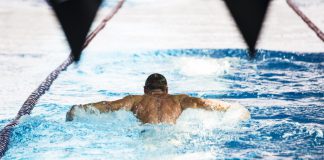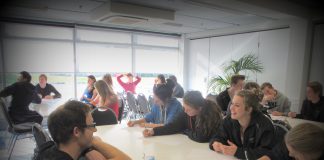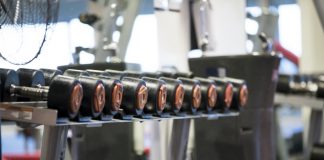Changing jobs can be an anxious and nervous time for anyone, but for an athlete, the trepidation around leaving the sport they’ve dedicated their life to can be daunting.
For weightlifter and Gym staff member Tracey Lambrechs, this is her new reality. Where previously her days were structured around trainings, nutrition and recovery, she’s now finding her place in the world as a “normal person”. Tracey has worked in the Gym for years as fitness instructor and now a membership support role, and her trademark laugh has been heard more regularly in the Gym since her retirement. “I’ve always had great support from AUT Millennium, and from our members,” she says. “They are awesome. I don’t think they realise just how much I appreciate them and the support they’ve given me throughout my career.”
Tracey retired at last year’s Gold Coast Commonwealth Games, signified in weightlifting by removing your shoes on the platform. “I hadn’t planned on retiring there and then,” she recalls. “I was too focused on competing. The idea of retirement had been floating in the back of my head, but I had been thinking it would be towards the end of 2018. It just happened in the moment.” One year on, there are no regrets. “I was worried I’d be filled with dread, or ‘what have I done?’, but I have no regrets,” she says. “I’m able to eat what I like, and go on holidays with my friends and not have to worry about finding a place to train. There’s no more double training days, no more sore body, no more painkillers. I have been to watch weightlifting competitions since, and I didn’t miss competing. I am happily retired!”
With a long career which took her to three Commonwealth Games, including bronze in Glasgow in 2014, and the 2016 Rio Olympics, Tracey was happy to finish on her own terms. “I had such a sense of relief that I got to make the call myself, and retire with so many of my family and friends there. There was never going to be a better time,” she says. “You hear about athletes who retire overseas away from their families, or due to injury. You never want to finish your career because you’re forced to.” Tracey made the most of her final days as an athlete, celebrating back at the New Zealand village, and supporting other Kiwis as they competed.
The last few years of her career were closely linked to the story of transgender lifter Laurel Hubbard. With Laurel competing in the same category, Tracey was faced with dropping 18kg to compete in the 90kg category on the Gold Coast. Her personal drive and competitive spirit saw her achieve this in three months, an incredible feat given the time period and unchartered circumstance. Acknowledging that a transgender athlete is a new situation that no one within weightlifting or the wider sporting community had a roadmap for, Tracey feels that Olympic Weightlifting New Zealand (OWNZ) left the athletes without support in the months leading up to the Games. “I think OWNZ were too concerned with how they would be seen and the benefits of this situation, rather than supporting all the athletes,” says Tracey. “I was forced into a new category with no support, and I don’t know if Laurel got the right support either. It all got a bit complicated, and I found there were more negatives than positives in my last couple of years in regards to the management of athletes and their needs to ensure success on the international stage.”
That said, she is excited by some of the talent coming through in the sport. “Our numbers are up, and there’s a lot of potential in the emerging athletes,” Tracey tells. “There’s some with the ability to do amazing things. We just need to make sure they have the right support.” Not shy about discussing the matter, she feels that the only thing hindering the sport’s advancement is politics. “There are politics in every sport, and weightlifting is no different,” she says. “We need to make sure the people involved in coaching and management are in it for the love of the sport and all athletes, rather than personal gain for themselves or just their own athletes. You can’t be playing athletes off against each other – they all need the same support.”
PAYING IT FORWARD
With her own coach being a positive influence in her career, Tracey was keen to pass on her experience and advice to her fellow athletes in any capacity. Athlete villages are a good place to connect with people from different sports, and a friendship with trap shooter Natalie Rooney has blossomed into a management role. “We first met in Delhi in 2010, and stayed in touch across the years,” she tells. “On the Gold Coast, I could tell something was a little different, so asked if there was anything I could do to help her. Within a few months, she reached out and asked if I could come on board as her manager.”
Tracey’s job description with Natalie is fluid, but she generally takes care of anything that allows Natalie to focus on shooting. “I make bookings, ensure there’s a gym for her to train in, and assist in the process of checking in the gun at airports,” she says. “During trainings, I make sure both she and her coach are fed and hydrated, and that ammo is sorted.” One area which Tracey finds particularly interesting is the coach-athlete relationship. “I try to make sure they have a balanced relationship, because athletes are prone to having an excuse for everything. I’m there for Natalie to chat to and help her figure things out, while at the same time I’m listening to her coach, hearing what he has to say and helping them both out in my own way. They have a great coach/athlete relationship, but like all relationships, they have their ups and downs. That’s healthy, and I’m there to help them when needed.”
While it might not be immediately apparent how weightlifting translates to shooting, Tracey finds that her years of performing at the highest level does carry across into Natalie’s sport. “Shooting can be a long game, but one missed target and you’re potentially out. So I try to remind Natalie to relax and breathe, and that the background might be a little different, but you’re still shooting a target. That was the case with me. At the end of the day, it was still lifting a weight on a platform, me and the bar and nothing else. I can pass on the feedback that helped me during my career.”
The experience of supporting an athlete has been an enjoyable one for Tracey, and she’d like to do the same for more sportspeople. “I love being there for athletes,” she says. “I want them to have the same support and opportunities that I had, and to treat them as more than just an athlete as well. I’d love to continue that sort of role.” It has opened her eyes to another side of high performance life, however, and makes her even more thankful for her own coach throughout the years. “I’m just realising how much work an athlete is!” she laughs. “I always thought I was an easy athlete but I’m starting to think I wasn’t!”
WHAT RETIRING ATHLETES NEED
With retirement being such a big shift in an athlete’s life, Tracey has some advice for those in the close circle of sportspeople transitioning into ‘real life’. “The biggest thing friends and family of a retiring athlete can do is not rush someone,” she tells. “It’s a complete lifestyle change, it doesn’t matter who you are or how happy you are to be retired. You’re asking yourself ‘Who am I, really? What am I supposed to be doing?’ And if they’re struggling with that question, it might be helpful to sit down and make a plan of what they want to achieve, to keep that goal aspect in their life.” For athletes who seem to be floundering without the structure of their routine, Tracey recommends reaching out to someone they trust within sport. “Ask that someone to speak to them,” she says. “It always helps when you’re talking to someone who understands what you’re going through.”
For Tracey, she at least knows where her passion lies beyond sport. She enjoys working with people, which is why she loves her membership support role at AUT Millennium Gym. Having completed a degree in event management during her time as an athlete, she thrives in organising events for Gym members and seeing them come together outside of the Gym. Another avenue she’s interested in exploring is the speaking circuit. “I love public speaking, talking about my different experiences in sport,” Tracey says, recalling speeches at schools, the ASB Sports Awards, Warriors Club lounge, and even the New Zealand Women’s Boxing team.
Whatever the future holds, Tracey’s sporting career taught her resilience and adaptability to cope with whatever arises. “I’m not sure what will come my way, but I’m ready for anything!”






































